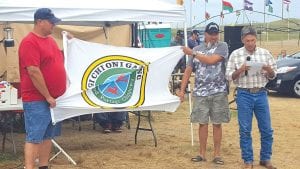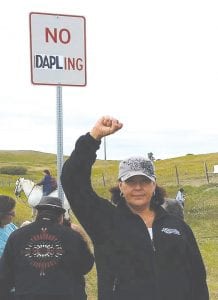A group of band members of the Grand Portage Band of Lake Superior Chippewa traveled to Cannonball, North Dakota to show solidarity with the Standing Rock Sioux Tribe in its opposition to the Dakota Access Pipeline. Bob Deschampe (left) and Joe Porter brought a resolution of support from the Grand Portage Tribal Council. They proudly held the Grand Portage flag as Standing Rock Sioux Councilman Joe Dunn read the resolution.

Although Energy Transfer, the Texasbased company that is constructing the Dakota Access Pipeline (DAPL), also known as the Bakken Oil Pipeline, asserts that the pipeline project is being constructed in accordance with federal guidelines, the Standing Rock Sioux Tribe disagrees. The Sioux Nation has gained support from approximately 150 other tribes across the United States, as well as support from hundreds of non-Native Americans, all gathering near Cannonball, North Dakota in an attempt to halt construction of the pipeline through ancestral Tribal lands. Joining Standing Rock is the Grand Portage Band of Lake Superior, with a contingent of community members traveling to North Dakota last week to hand-deliver a message of support.
On April 1, 2016, after years of bureaucratic efforts members of the Standing Rock Sioux Tribe established a camp to block construction of the pipeline. The population of the camp grew to over 1,000 by mid-August and is now estimated at 2,500.

The Stonebridge Singers of Grand Portage were invited to offer a drum song at the Sacred Stones encampment at Cannonball, North Dakota where thousands of people have gathered to try to halt the Dakota Access Pipeline.
Joining the protectors
Dana Logan of Grand Portage, who returned on September 5 from a few days at the site, told the Cook County News- Herald that the size and organization of the camps was impressive. She said there is a main camp called the Sacred Camp to which donated supplies are delivered and two other camping areas, the Spirit Camp and Red Warrior Camp. One of the camps has electricity supplied by wind energy. A school has been set up for children.
The atmosphere, said Logan, was positive, even after the standoff turned ugly on September 3 when the residents of the camps and security for Energy Transfer clashed and people were sprayed with mace and several people suffered dog bites. Logan arrived just as people were heading back to camp. She gave some friends a ride to her hotel to shower to get rid of the repellent.
The next day everyone returned to the site of the confrontation for a prayer rally. “Everyone marched from the campsite. There had to be about 500 people there and the leaders asked for healing,” said Logan.

Dana Logan of Grand Portage shows her support for the people at the encampment at the route of the Dakota Access Pipeline (DAPL).
“They are very clear. They are not protestors,” said Logan. “They are protectors. We were there to help protect the water.”
Throughout her time at the encampment, Logan said there were continuous declarations of support, drum song and dancing. “Tribes from all over the United States came, bringing their flags and gifts for the protectors. As we were leaving, people just kept coming,” she said.
Logan was accompanied by the members of the Grand Portage drum group, the Stonebridge Singers—her sons, Marcus and David Logan, Brent Sorenson, John Vogel and Tanner Hendrickson. The young men did not bring their drum, but were invited to use a drum at the camp, which they did.
Bob Deschampe and Joe Porter also represented Grand Portage, bringing a resolution of support from the Grand Portage Band of Lake Superior Chippewa. Deschampe and Porter proudly held the Grand Portage flag as Standing Rock Sioux Councilman Joe Dunn read the resolution.
Deschampe too was impressed by the number of people supporting the Standing Rock Tribe. He and Porter visited with Lawrence O’Donnell of MSNBC’s The Last Word. “It was really exciting,” Deschampe said, “I’m proud to have been there for Grand Portage.”
Standing Rock in court
Earthjustice of Seattle, Washington, representing the Standing Rock Tribe, filed for an injunction to halt pipeline construction on July 27, 2016.
In an August 30, 2016 affidavit to the court, Dave Archambault II, chairman of the Standing Rock Sioux explained, “DAPL met with the Standing Rock council in late 2014. They declared the pipeline route they chose, without our input. That is not consultation. That is not respect…We immediately expressed our concerns… our comments fell on deaf ears.
“My nation’s history is at risk because pipeline builders and the Army Corps failed to consult the tribe when planning the pipeline and routed it through areas of cultural and historic significance, which will be destroyed,” said Archambault.
The 48-page request for injunctive relief states that the Corps of Engineer issued authorizations in violation of the Clean Water Act, the National Environmental Policy Act (NEPA), and the Rivers and Harbors Act, as well as the National Historic Preservation Act (NHPA). The Tribe asked the court to declare that the authorizations were made in violation and to vacate those authorizations pending full compliance of the CWA, NEPA and NHPA.
Under NHPA, any federal projects that potentially affect sites culturally significant to Indian Tribes—whether ceded or not—“must ensure that the process provides Tribes with a ‘reasonable opportunity’ to identify its concerns about historic properties, advise on the identification and evaluation of historic properties…articulate views on the undertaking’s effects on such properties and participate in the resolution of adverse effects.”
The Tribe states that the out-of-state, non-Tribal consultants hired to complete cultural surveys along the route are unable to properly assess the potential cultural significance.
The legal document reminds the court that, “Since time immemorial, the Tribe’s ancestors—the Oceti Sakowin, also known as the Great Sioux nation— used and occupied a broad area throughout the northern Great Plains, including much of the area that DAPL proposes to traverse with the pipeline.”
In addition to protection of ancestral lands, Earthjustice noted that the Standing Rock Nation also has a cultural interest in preserving the quality of the land, water, air, fauna and flora within the Tribe’s traditional territory. The Tribe is greatly concerned with the possibility of oil spills and leaks from the pipeline. The complaint also alleges that wetlands and waterbodies delineation were not properly completed.
A preliminary injunction is a request to the Court to preserve the status quo until the issues can be fully resolved. At press time, the judge’s decision was still pending.
Pipeline company promises safety
According to the Energy Transfer website, the goal of constructing the pipeline through the states of North Dakota, South Dakota, Iowa and Illinois is to relieve transportation strains on rail for crude transportation and to “safely transport U.S. crude oil to U.S. markets via pipeline to further the goal of energy independence.”
Energy Transfer explains the Dakota Access Pipeline project is a new underground crude oil pipeline designed to transport 470,000 barrels of crude oil per day (with a growth potential up to 570,000 barrels per day) from the Bakken/Three Forks formations in North Dakota to a terminus near Patoka, Illinois.
The project will require the construction of approximately 1,172 miles of 12-inch to 30-inch diameter pipeline. The work is being done by Dakota Access, LLC, a company of Energy Transfer Partners.
According to its website, Energy Transfer and its various pipelines have provided transportation services since the early 1900s through an extensive network of underground pipelines. Energy Transfer’s crude oil pipeline business consists of approximately 5,400 miles of pipelines. The website states, “We have designed, built, and safely operated pipelines throughout the United States. Our employees ensure our pipelines operate safely, efficiently, and reliably year round and in compliance with all federal, state, and local laws and regulations.”
Of the project, Energy Transfer wrote, “DAPL has enlisted the services of Key Agricultural Services and Duraroot, who will serve as independent auditors of the project plans, including agricultural engineers, drainage contractors, agronomists, and conservation planners, who will lend their expertise to discussions between landowners and Dakota Access team to develop plans to mitigate and restore any impacts to agriculture and sensitive lands that may be traversed by the pipeline.”
The words are not reassuring to Bob Deschampe, who summed up his concerns about the North Dakota project by quoting one of the speakers, “You can’t eat money and you can’t drink oil.”
Grand Portage Band of Lake Superior Chippewa Resolution on Standing Rock
Whereas, the Grand Portage Reservation Business Committee is the governing body of the Grand Portage Reservation; and
Whereas, the Grand Portage Reservation Tribal Council supports all tribes and their commitment to protect their sovereignty; and
Whereas, the Grand Portage Reservation Tribal Council recognizes that the President of the United States and his administration does have a treaty and trust responsibility to protect all Indian Nations water and resources; and
Now therefore be it resolved that the Grand Portage Reservation Tribal Council does stand in solidarity and support of the Standing Rock Sioux Tribe and other communities in their fight against the Dakota Access Pipeline.


Loading Comments